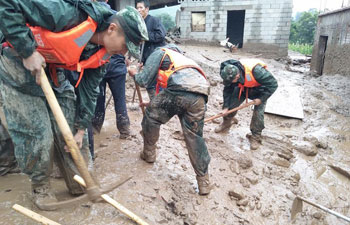WASHINGTON, Aug. 8 (Xinhua) -- A federal department of a country which has long prided itself on championing free speech worldwide is now censoring the use of nomenclatures including what has become a commonsense term both in the academia and among the general public -- climate change.
It appears that the aim of the clampdown has been to align the state's apparatus with new policy priorities of the country's leader, who has infamously and repeatedly denounced climate change. Ooops, sorry! ... But what should we call it?
According to a series of emails obtained by British newspaper the Guardian from a branch of the U.S. Department of Agriculture (USDA), employees were told as early as February this year to avoid using the term "climate change" and opt instead for "weather extremes."
The Guardian reported that Bianca Moebius-Clune, director of soil health, had sent staff at the Natural Resources Conservation Service (NRCS) a list of terminologies to avoid in the future and their replacements. The NRCS is part of the USDA that oversees conservation of farmers' land.
At the center of controversy are words and phrases related to climate. Besides ditching "climate change," "climate change adaptation" is also blacklisted with "resilience to weather extremes" being its substitution.
In addition, staff are asked to say "build soil organic matter and increase nutrient use efficiency" instead of "reduce greenhouse gases," and "build soil organic matter" rather than "sequester carbon."
In an email to an NRCS employee named Tim Hafner dated Feb. 16, Moebius-Clune wrote: "We won't change the modeling, just how we talk about it -- there are a lot of benefits to putting carbon back in the soil, climate mitigation is just one of them," according to a link embedded in the Guardian report that directs to the full transcript of the emails the newspaper received.
One of the NRCS officials had even blatantly pointed out the reason behind these efforts, which is to part with one of the priorities of former president Barack Obama's administration that is no longer Donald Trump's now.
"It has become clear one of the previous administration's priorit[ies] is not consistent with that of the incoming administration. Namely, that priority is climate change," Jimmy Bramblett, deputy chief for programs at the NRCS, was quoted by the Guardian as saying in a Jan. 24 email.
"Please visit with your staff and make them aware of this shift in perspective within the executive branch," Bramblett added in the email, which he simultaneously sent to a group of his employees just four days after Trump's inauguration.
Listing four sets of concerns and causes associated with air quality which he said had been "approved" by the agency, the official urged "prudence" when discussing greenhouse gas emissions and called for a halt of the agency's work concerning these gases' impacts on air quality "until further notice."
The censorship and instructions, which have been in practice since nearly half a year ago but only recently came to light, have not only left employees puzzled, but also, in some cases, evoked their resentment.
Hafner solicited appropriate words from Bramblett in a Feb. 16 email, saying: "I would like to know correct terms I should use instead of Climate Change and anything to do with Carbon .... I want to ensure to incorporate correct terminology that the agency has approved to use."
In addition, Suzanne Baker, another NRCS employee based in New York, questioned on April 5 whether staff like her are "allowed to publish work from outside the USDA that use 'climate change'."
Her colleague, Dan Lawson, advised her in a reply to carry on "until directed to proceed differently," without elaborating on what "carrying on" meant exactly.
Other staff, however, appeared to have toned more sharply. Gabrielle McNally, for example, said in a July 5 email to Lawson in which she was seemingly discussing wordings in a research:
"You know, it really doesn't fit with the framing of our project ... We would prefer to keep the language as is ... because this aligns best with the language used in our research and maintains the scientific integrity of the work."
Trump upset other world leaders when he announced in June the decision to withdraw the United States from international efforts in slowing down global warming, saying such a pullout was to protect the interests of Americans working in the fossil fuel sector from being harmed by what he called the "hoax" of climate change.
"These records reveal Trump's active censorship of science in the name of his political agenda," Meg Townsend, an attorney at the U.S.-based Center for Biological Diversity, was quoted as saying by the Guardian.
Townsend's organization has filed lawsuit against U.S. government agencies, including the Environment Protection Agency and the Department of State, to force them to release information on alleged censorship targeting vocabularies related to climate change, the Guardian said.

















